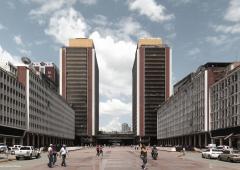Articles by: Mark Weisbrot
To tackle the biggest hurdle facing Venezuela’s economy – the black market dollar – policymakers must unify the exchange rate.
When is it considered legitimate to try and overthrow a democratically elected government? In Washington, the answer has always been simple: when the U.S. government says it is.
The only thing missing from Brazilian President Dilma Rousseff’s speech at the UN General Assembly last month was “it still smells like sulfur.” These were the immortal words of Venezuela’s President Hugo Chávez in 2006.
"The IMF is back," declared the International Monetary Fund's managing director, Dominique Strauss-Kahn, at its annual spring meeting earlier this month in Washington. And not a moment too soon either. To hear the organization's economists tell it (as they mingled in five-star hotels, long black limos and posh restaurants with bankers, businessmen and finance ministers from around the globe), they've arrived on the scene just in time to help solve the world's financial crisis.
Of all the nonsense that we hear regularly about Venezuela, the idea that the country is a "security threat" is probably the most ridiculous. For six years now, since the Bush Administration supported a failed coup attempt against the democratically elected government of President Hugo Chavez, Washington has been sporadically accusing Venezuela of links to "terrorism."
Barack Obama had a few choice words for Bill and Hillary Clinton after the South Carolina primary, about people who would "say anything and do anything to win an election." Imagine if the U.S media had reported his remarks without ever reporting what the candidate was responding to. (He was reacting to former president Bill Clinton's comparison -- widely seen as racial politicking -- of Obama's South Carolina victory to Jesse Jackson's in the 1980's; and Hillary Clinton's attack ads). It would not be considered acceptable journalism in the United States to omit these key facts. But in U.S. coverage of Latin America, the same standards do not apply.
"Developing nations must create their own mechanisms of finance instead of suffering under those of the IMF and the World Bank, which are institutions of rich nations . . . it is time to wake up."That was Lula da Silva, the president of Brazil—not Washington's nemesis, Hugo Chávez—speaking in the Republic of Congo just two weeks ago.

